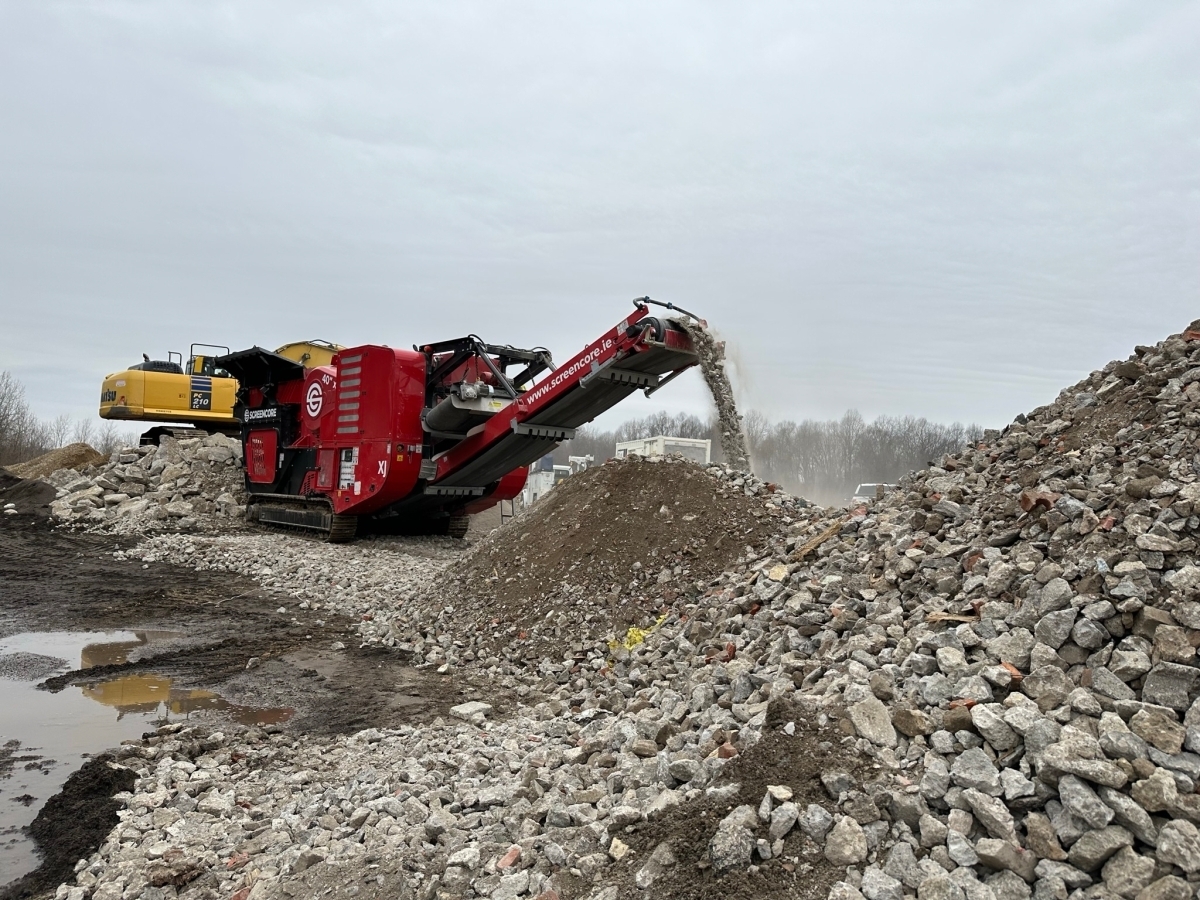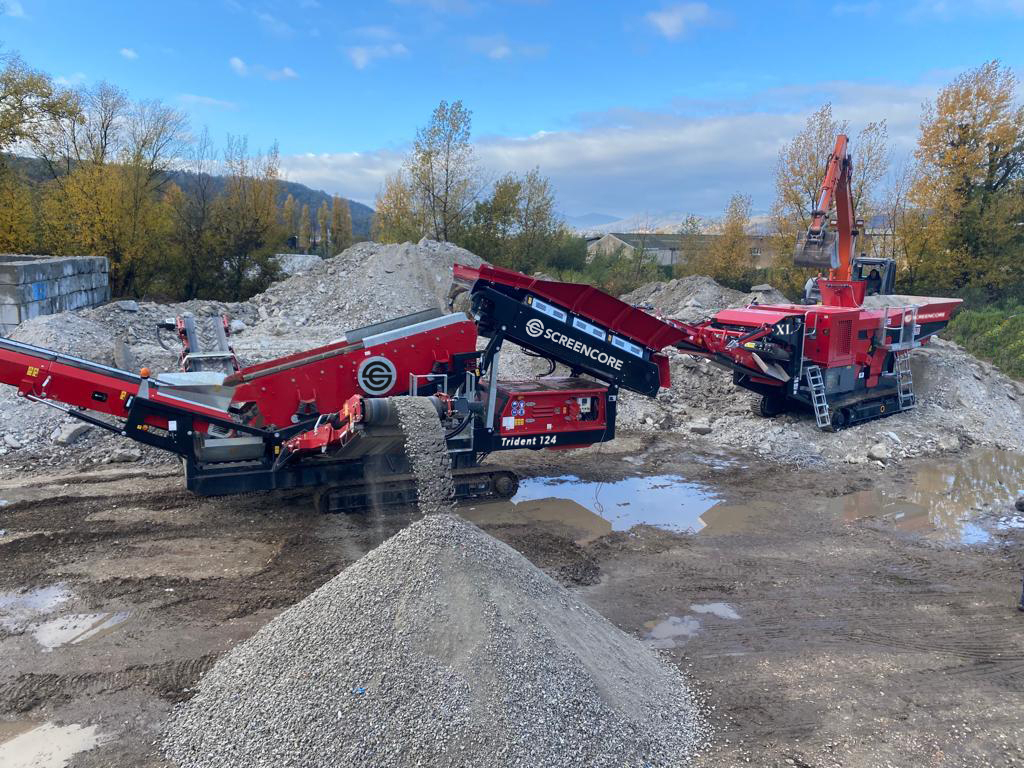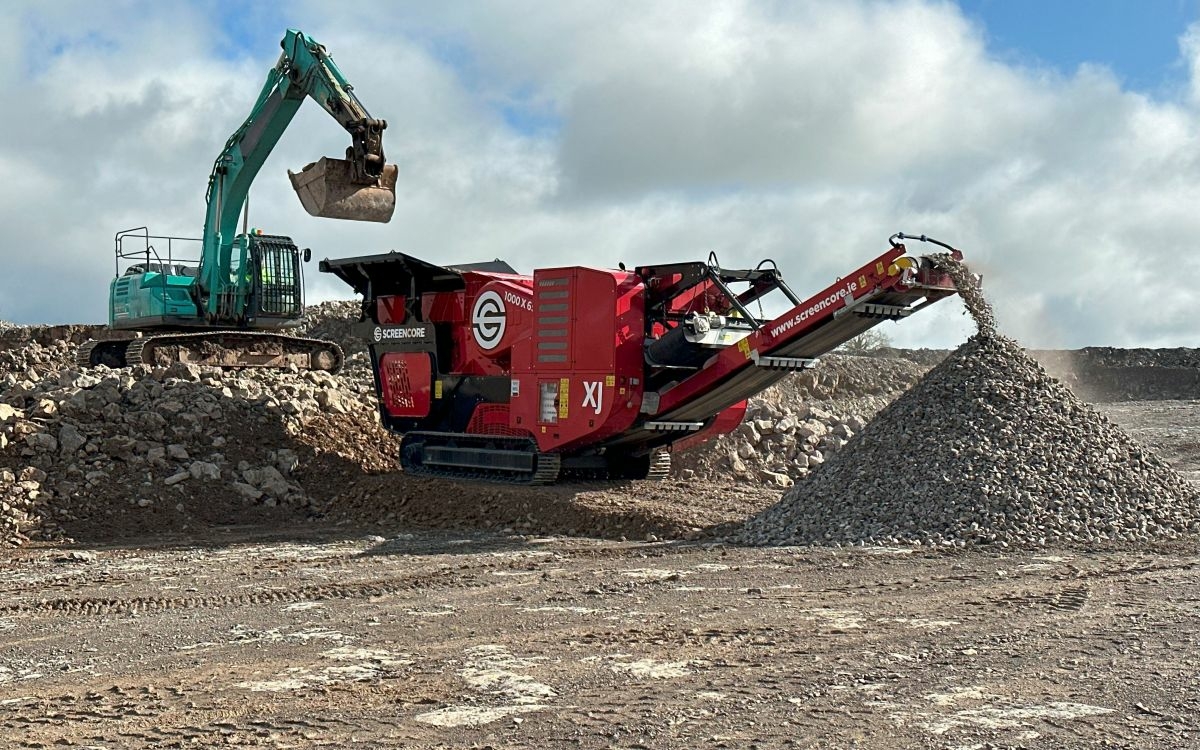Recycling construction and demolition materials with the modern solution
10.04.2025Although highly suited to primary aggregate production in quarries and sand and gravel plants, Screencore’s mobile and modern range of mobile solutions has found a real niche in processing materials arising from construction operations. Possessing exceptional productivity but at the same time being fuel efficient, the crushers, screens and stockpilers are now at work throughout the world processing a variety of materials, turning what was once considered to be waste into a valuable resource.
 Screencore XJ Dual-Power Crusher
Screencore XJ Dual-Power Crusher
Companies working in the demolition and recycling industries have been quick to see how Screencore material processing and handling equipment can aid their business operations. Playing a major part in the success of Screencore has been the company’s extensive international distributor network. The relationship forged has led directly to a number of compact Screencore tracked jaw crushers, Trident scalper-screens, Orbiter trommels and radial stockpilers being used to recycle construction and demolition materials. To this can now be added a bespoke selection of stationary recycling plants. All of these solutions are designed to benefit users, heling them to turn waste into high quality aggregates and other valuable products.
The adoption of Screencore equipment by distributors in such countries as the US, France, the UK, Australia and South Africa (often alongside existing product portfolios) directly points to the versatility and processing efficiency of the Screencore range. “The Screencore product range was developed in order to meet the needs of the modern contractor and materials handling operation. We have set out to build to the highest standards equipment that helps people in the field be more profitable, efficient and effective in what they do. We have also incorporated environmental efficiency into every step of our processes to minimise customers’ carbon footprint. All this has meant that working with our distributors has seen Screencore equipment adopted on numerous projects, turning construction waste into reusable and/or resaleable products,” explains Screencore director, Ciarán Ryan.
 Trident 124 Scalping Screen
Trident 124 Scalping Screen
© Screencore
Modern and affordable crushing and screening
A typical application – in this case in the US – sees, in the first instance, a Screencore XJ Dual-Power Crusher being fed the demolished or excavated material, usually by an excavator or loading shovel. The Screencore XJ itself is a dual-power 1000 mm x 650 mm jaw crusher designed with a compact footprint. It has proved to be ideally suited to the modern demands of a recycling contractor, rental fleet or inner-city demolition/recycling site. It weighs in at just 30 000 kg which means that it can be easily relocated without the need for permits. It is designed to be both environmentally and acoustically friendly while delivering impressive throughput even on hard rock applications or concrete with rebar.
Following crushing to -100 mm, the material is then fed into a 17 000 kg Trident 124 scalper/screener to produce 0/25 mm, 25/60 mm and +60 mm products. In addition, any ferrous metals such as rebar or wire, are easily removed for resale/recycling by the overband magnet on the XJ crusher’s discharge conveyor before being fed into the screen. In many applications the 0/25 mm material is generally used for pipe bedding; 25 to 60 mm directly as road subbase or as feed material for secondary crushing for concrete production, whilst the +60 mm is used as drainage stone. The combined set-up time for this crushing and screening combination is less than 30 minutes.
Getting to the material
Due to the easily transportable and modern nature of the equipment, contractors and rental fleets have found that the Screencore crusher and screen combination can be readily transported to where the material is. This means that the material can be processed where it originated, and generally where it is needed, resulting in no unnecessary emissions, material handling or transport costs. In addition, the local environment is not subject to unnecessary traffic disturbances and the overall carbon footprint of the contract is dramatically reduced. “Quick set up times, easily adjusted closed side settings, fuel efficiency (dual-power) and ease of transport are just some of the reasons that has seen contractors and recyclers adopt Screencore equipment,” explains Ciarán Ryan.
For some operations however, mobility is not essential. This has led Screencore to use its expertise to develop a range of bespoke stationary solutions based around its Orbiter trommel range working alongside Screencore stockpilers and scalpers. “Screencore provides a variety of customized stationary solutions tailored to suit individual applications. Our dedicated in-house design team collaborates with our distributors and their customers to develop an efficient and long-lasting material handling system. Leveraging our electrical power expertise, we ensure that any system satisfies requirements.
“Screencore will custom-design conveyors, stockpilers and feeders to meet any application requirements. Our designs are renowned for their quality and ease of assembly, arriving in neatly packed containers and specified to over-deliver on throughput expectations. We also supply a range of air separation systems for use in both stationary and mobile plant. Engineered for plastic or ‘lights’ contamination removal from C&D, compost and mulch, the Revac and AirKnife units are available in diesel or electric power to suit customer requirements,” explains Ciarán Ryan.
Low cost and low emissions
Screencore’s stationary and mobile equipment come with power solutions to suit various customer requirements. Stationary, and increasingly mobile plants, are electrically powered which makes efficient and cost effective use of main electricity to provide a low cost and low emission solution. “Screencore has gained a great deal of experience in using electric power from a variety of sources. Mains electricity has proved to be an ideal power source delivering a cost effective and environmentally efficient solution. Through the use of this power source, or the dual-power solution, precision processing of materials is accomplished without producing the emissions that would be of concern, and at the same time, at a low cost,” concludes Screencore director Ciarán Ryan.

